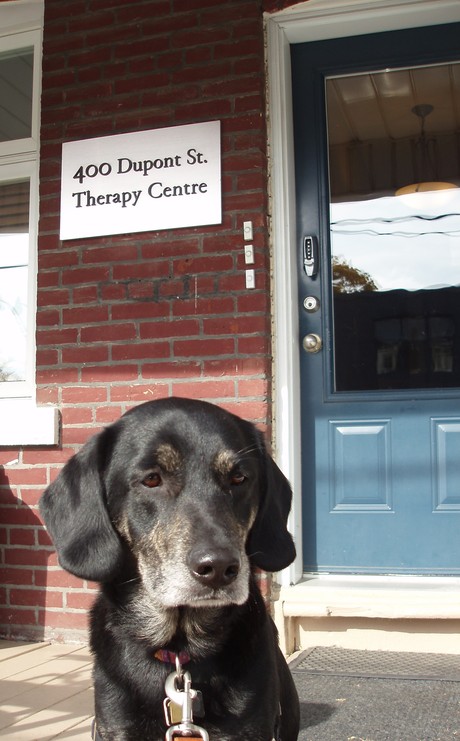Pet projections -- my dogs, my shrinks

McCracken as we leave my therapist's (he's sad the session's over)
I've learned a lot about my therapists (yes, plural - it's a lifelong learning project) from their attitudes to my dogs. Joseph Burgo, a clinical psychologist, has written that he's come to see pets as a way to gain insight into his clients (The Pets in My Practice, NYT). Because he counsels online via Skype, Burgo often glimpses client-pet interactions. Well, Dr. Burgo, I'd like to say that it goes both ways.
Keep in mind that what I write here is entirely one-sided, seen through the haze of transference and the fog of memory. If you don't have a psychotherapist, have never had a psychotherapist, and know with confidence that you'll never need one (really?), skip this post. If, on the other hand, you see a therapist, or need to but can't find or afford one, and you live with a pet, read on.
My first psychiatrist was a kind and literary man. A couple of years into our work together, we were both surprised by my sudden impulse to get a dog. I had always preferred cats. Discussing my dog desire, something about my therapist became clear to me: he believed that insights into why I wanted something should cure me of wanting it -- the fool. We determined that the ignoble motive behind my desire for a dog was rivalry with my offspring-producing brother. I got a dog anyway.
Mim, the puppy who landed in my lap, was only 5 weeks old. I was ecstatic, terrified, and totally preoccupied. My therapist, who had previously mentioned to me the difficulty of working with clients who are newly in love, seemed to find puppy love particularly trying. His lips tightened in disapproval whenever I mentioned Mim; he sometimes impatiently changed the subject.
When I confessed my fear that the cat, Stella, substantially bigger than the tiny puppy, was stalking her, and might try to attack her when I left them alone together (a crate provided only so much protection from her fierce and lethal paw), he asked, "Maybe you want Mim to die?"
Well, someone certainly did.
Eventually I reproached him: he was negative or withdrawn whenever I talked about my dog. He looked thoughtful, and said no, he didn't think so. In the following week's session, good therapist that he was, he acknowledged countertransference was at work. His daughter wanted a dog, he explained, and he and his spouse were reluctant: dogs were untidy, and needed a lot of care.
On the one hand, I was moved by his honesty, and thrilled by the fact that I was right. On the other hand, what kind of father wouldn't get his daughter a dog? Was this a 'good enough' dad?
Our therapist-client fit was good enough to banish the most destructive of my behaviours, but not the depression that drove them. I moved on to therapist No. 2, an MD trained in cognitive behavioural therapy. On learning that my dog Mim came to work with me, she invited me to bring her along to therapy. I may have weaselled the invite.
No. 2 was very polite to Mim, although she frowned on Mim's excavations of the waste paper basket and on her chewing of office art work. Possibly these activities were a bit distracting from the project at hand. Over time, No. 2 showed she could be playful and affectionate with Mim, just as she was with me. But I sometimes felt I suffered in comparison to Mim, who was a non-needy, joyful alpha, whereas I, at the time, was not. Despite No. 2's humorous, nurturing persona, I often evoked in her a flash of resentment, a sigh of exasperation -- much more often than Mim did, even though I was not the one scrounging around in the office recycling bin.
No. 2's cognitive behavioural techniques prompted me to make a variety of practical life changes: taking a leave of absence from my desk job, getting a second dog, becoming a dog walker, and, finally, looking for a new therapist.
Not surprisingly, I met my current therapist at the dog park. She adored her dog -- no shades of resentful nurturing here. No. 3 was as fascinated by the canine-human bond as I was, so I could talk about my dog-related emotional entanglements without embarrassment. She helped me negotiate professional hazards: the problem of loving dogs who do not belong to me, and whose care decisions I cannot make. And dealing with, given dogs' shorter lifespans, all too frequent deaths.
Currently, No. 3 and I are both enjoying my young dog McCracken, who has been coming with me to therapy since puppyhood, and who has a terrible crush on her. I'm sure I'm not projecting. He's very distressed when she gently rebuffs his ultra-licky overtures. Many heaved sighs and aggrieved looks are cast her way. She handles it well, and pays more attention to my dramas than to his.
A few years ago, I ran into therapist No. 1. He was happy to see me, and, when I explained that I was now a dog walker, he told about the dog who had joined his family. "Getting a dog changed our lives," he said with great enthusiasm. Obviously, life-long learning projects come in many forms. My favourite kind is canine.
For Joseph Burgo's The Pets in My Practice:
http://opinionator.blogs.nytimes.com/2014/12/20/the-pets-in-my-practice/